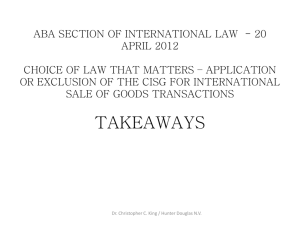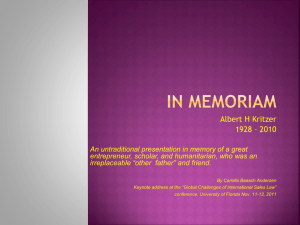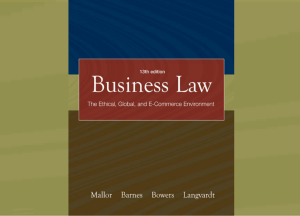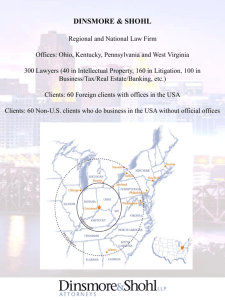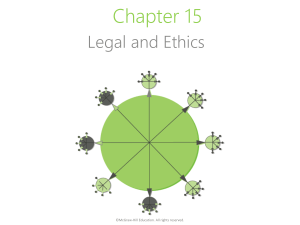联合国国际货物销售合同公约
advertisement
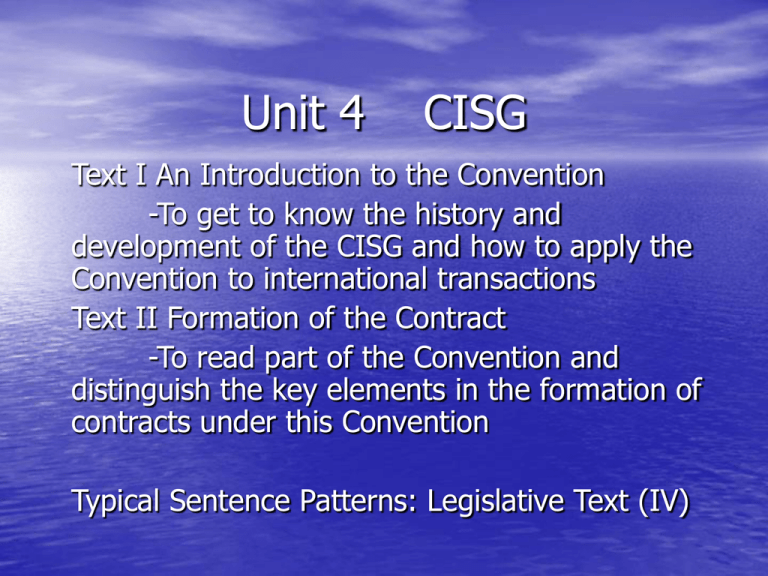
Unit 4 CISG Text I An Introduction to the Convention -To get to know the history and development of the CISG and how to apply the Convention to international transactions Text II Formation of the Contract -To read part of the Convention and distinguish the key elements in the formation of contracts under this Convention Typical Sentence Patterns: Legislative Text (IV) Text I An Introduction to the Convention Useful expressions: place of business, under (the contract), prevail over, bring an action for, defective merchandise, multinational corporation, be excluded from, negotiable instrument, in preponderant part, opt out of, derogate from, accede to Terms: conflict of law, assembly contract Proper names: UNIDROIT, the League of Nations, UNCITRAL, CISG, UCC, the Chinese Foreign Economic Law Questions based on Part I 1. What international organ took the initiative to draft the CISG? 2. What is the legal effect of the CISG upon member countries of the Convention? 3. When to apply the CISG and when to apply the Chinese Foreign Economic Contract Law in China? Terms and proper names • CISG (联合国)国际货物销售合同公约 • (see both versions of the CISG texts at http://www.cisg.law.pace.edu/) • • • • • • UNIDROIT (罗马)国际统一私法协会 the League of Nations 国际联盟 UNCITRAL 联合国国际贸易法委员会 place of business 营业地 the Chinese Foreign Economic Contract Law 中国对外经济合同法 UCC (美国)统一商法典 • (see “UCC Articles” at http://www.law.cornell.edu/ucc/ucc.table.html) Terms and proper names • conflict of laws 冲突法 -section in a country’s legal statute which deals with disputes between that country’s laws and those of another country structure of a conflict rule – 2 parts: category / class (范围)and attribution(系 属包括连接点connecting point / factor和准据法proper law) – E.g. Ownership to immovables is governed by the law of the place where the property is situated. 不动产依不动产所在地法。 Questions based on Part II • 1. When to apply the UCC and when to apply • • • • the CISG in the U.S.? 2. How to define the place of business when the commercial transaction concerns a multinational corporation? 3. What kinds of sales fall outside the scope of the CISG? 4. Why are consumer sales excluded from the CISG? 5. How can a contracting state opt out of the Convention? Terms and proper names • negotiable - an instrument is negotiable when • • • the rules of law allow it to be traded between parties consumer protection - actions taken (sometimes in the form of laws) to protect consumers from defective goods and services opt out of - to choose not to participate in something derogation- the partial abrogation of a law. To derogate from a law is to enact something which is contrary to it, while to abrogate a law is to abolish it entirely Text II Formation of the Contract • Preamble • THE STATES PARTIES TO THIS CONVENTION, • BEARING IN MIND the broad objectives in the resolutions adopted by the sixth special session of the General Assembly of the United Nations on the establishment of a New International Economic Order, • CONSIDERING that the development of international trade on the basis of equality and mutual benefit is an important element in promoting friendly relations among States, • BEING OF THE OPINION that the adoption of uniform rules which govern contracts for the international sale of goods and take into account the different social, economic and legal systems would contribute to the removal of legal barriers in international trade and promote the development of international trade, • HAVE DECREED as follows: Text II Formation of the Contract • 联合国国际货物销售合同公约 • • • • • • (1980年4月11日订于维也纳) 本公约各缔约国,铭记联合国大会第六届特别会议通过的关于建 立新的国际经济秩序的各项决议的广泛目标,考虑到在平等互利基础 上发展国际贸易是促进各国间友好关系的一个重要因素,认为采用照 顾到不同的社会、经济和法律制度的国际货物销售合同统一规则,将 有助于减少国际贸易的法律障碍,促进国际贸易的发展,兹协议如下: 第一部分 适用范围和总则 第一章 适用范围 第二章 总则 第二部分 合同的订立 第三部分 货物销售 第一章 总则 第二章 卖方的义务 第三章 买方的义务 第四章 风险转移 第五章 卖方和买方义务的一般规定 第四部分 最后条款 Text II Formation of the Contract • CISG PART II -- FORMATION OF THE CONTRACT – – – – – – – – – – – Article Article Article Article Article Article Article Article Article Article Article 14 15 16 17 18 19 20 21 22 23 24 [Criteria for an offer] [When offer becomes effective; prior withdrawal] [Revocability of offer] [Rejection of offer followed by acceptance] [Acceptance: time and manner for indicating assent] [“Acceptance” with modifications] [Interpretation of offeror’s time-limits for acceptance] [Late acceptances: response by offeror] [Withdrawal of acceptance] [Effect of acceptance: time of conclusion of contract] [When communication “reaches” addressee] Terms residence 居所 • -the place of general abode; principal, actual dwelling place in fact, without regard to intent • There is a difference between a man's residence and his domicile. He may have his domicile in Philadelphia, and still he may have a residence in New York; for although a man can have but one domicile, he may have several residences. • domicile 住所 • -the principal place of residence of an individual. This is determined primarily by intent. A good indication of domicile is where a person registers to vote. (habitual residence:有些国家以“惯常居住地”为“住所”) • “住所”的两个构成要素: – 某人在某地有居住的事实存在; – 在某地有久住的意思 Terms • “mirror image” rule 镜像规则 • –An acceptance which added qualifications or conditions or which in any way varied from the terms of the original offer was treated as a rejection and counter offer. This was true no matter how trivial the qualification or condition. This was known as the "Mirror Image Rule." The underlying rationale is that the making of a counteroffer communicates to the offeror that the offeree does not wish to accept the offer. Terms • mailbox rule 邮箱规则、投邮主义、发信主义 • - Although revocation and rejection of an offer are effective when received, the general rule is that a contract is made when the acceptance is dispatched, even though the letter of acceptance is lost and never reaches the offeror. Consent is deemed to be fully communicated when the offeree has placed his acceptance in the course of transmission to the offeror. In other words, acceptance is effective upon dispatch. (关于承诺之生效时间:,又称“postal rule”与“到达主 义”相对.) Terms • invitation to offer/invitation to treat 要约引诱


